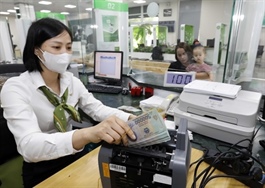Debt collection taking on new hue
Debt collection taking on new hue
Vietnam faces increasing complexities in consumer lending, with escalating concerns over illegal lending practices, challenges in debt recovery, and a call for stronger legal frameworks to manage non-performing loans and safeguard consumer rights.

Nguyen Quoc Hung, general secretary of the Vietnam Banks Association, detailed the challenges impeding the growth of consumer lending at a seminar on the issue in mid this month.
“The sector is not only grappling with broader economic difficulties but also faces serious issues such as intentional loan defaulting and social media groups promoting such behaviour, severely hindering debt recovery efforts,” Hung said.
This situation has led some financial institutions to reduce their consumer lending portfolios to prevent further escalation of bad debts. Legal challenges with borrowers, particularly in asset handover for debt recovery, are adding to the institutions’ woes, resulting in protracted legal processes.
Hung also highlighted the risks posed by bad debts and document falsification.
“The misuse of technology for fraudulent activities is threatening both individuals’ financial stability and the reputation of financial organisations,” he warned.
Meanwhile, some banks have also recommended measures to enhance consumer lending while controlling bad debts. Proposals included streamlined legal procedures for credit disputes, especially those secured by real estate, and integrating national population data for electronic information authentication.
A representative from Agribank pointed to recent economic challenges and a sluggish real estate market impacting loan security.
“Borrowers with multiple small loans across different institutions complicate the debt classification process, and non-cooperation in asset handover for debt recovery necessitates time-consuming legal interventions,” the representative explained.
“Moreover, we recommend that the Vietnam Credit Information Centre adopt more nuanced debt classification policies for customers with multiple loans. For instance, a loan at Agribank should not be automatically classified as bad if a borrower’s loan at another institution is classified as such.”
Additionally, the representative underscored the necessity for a national database on real estate and collateral valuation, stating, “Access to such a database would be crucial for credit institutions to accurately assess credit ratings and digitalise lending processes, significantly reducing associated risks,” he said.
Highlighting the urgency for legislative action, Agribank advocated for new regulations to succeed Resolution 42 of the National Assembly, which is due to expire at the end of 2023. “Timely legislation is essential to maintain the banking system’s efficiency, particularly in managing non-performing loans,” the representative said.
A BIDV representative suggested that the State Bank of Vietnam consider allowing credit institutions to use alternative authentication methods. “For smaller online loans, exempting the verification of loan purposes could be beneficial,” he said.
Bui Duc Tai, deputy head of the Criminal Police Department at the Ministry of Public Security, stressed the importance of utilising national population databases effectively for authentication, cleansing, and the elimination of “ghost” bank accounts.
“We urge legitimate financial institutions to streamline their credit issuance processes, which will enhance state management efficiency and play a crucial role in combating illegal lending,” Tai said.
Kian Foh Then, CEO of Asian debt restructuring group Collectius, said, “Our approach involves leveraging top-tier technical solutions to optimise the customer experience in debt recovery. We combine this with an open communication strategy, focusing on understanding and meeting customer needs to formulate practical repayment plans. This assists individuals in effectively managing their debts,” Then stated.
Then also noted the importance of regulatory frameworks in debt recovery.
“Globally, countries have established specific regulations and standards for debt collection. In regions like Singapore, Malaysia, and Thailand, stringent policies govern the outsourcing of debt recovery, ensuring financial institutions adhere to set guidelines. Non-compliance by external debt collectors is met with substantial penalties,” he said.
























